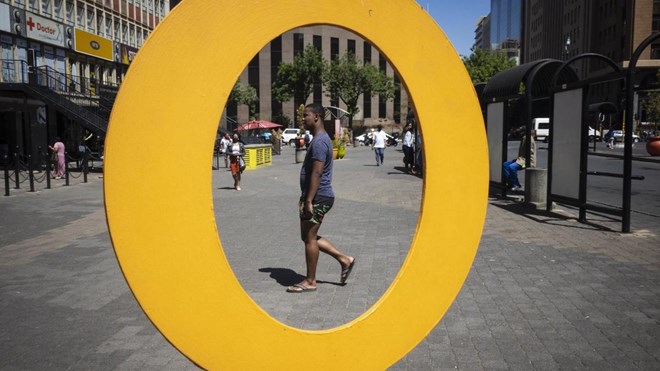
By Gavin du Venage
Monday October 5, 2020

People walk through Ghandi Square in Johannesburg as restrictions to limit the spread of Covid-19 ease. South Africa's severe lockdown led to about 2 million job losses during the second quarter, statistics show. EPA
Foreign nationals living in South Africa are often blamed for a range of social ills, including joblessness. As such, they risk falling victim to physical attacks by mobs that loot and burn their businesses – and sometimes take their lives.
Joblessness was already above 30 per cent before the pandemic. With one of the world’s harshest lockdowns that brought most of the country to a halt, the number of unemployed people has grown. At least 2 million people lost their jobs in the second quarter, according to the latest figures from the government statistics body StatsSA, as the economy contracted 51 per cent.
“There has never been a period in our history where in one quarter, more than 2 million people have lost their jobs,” Mike Schussler, chief economist at economists.co.za in Johannesburg, said. The true figure of unemployment in Africa's most industrialised economy could now be as high as 45 per cent. The US, the world's largest economy, lost 21 million jobs in March and April.
The government of president Cyril Ramaphosa and his African National Congress are due to announce an economic recovery plan. However, the state has a long record of setting out plans that are not fully implemented, Mr Schussler said. “This makes it very difficult to convince investors, or even local businesses to expand, even just a little.”The only glimmer of light is the number of jobs being created through call centres. Amazon recently said it will hire 3,000 people in the country, and a new report by consulting firm McKinsey argues South Africa now rivals India as a call centre destination.
In such a climate, it becomes easy to target seemingly better-off immigrants and refugees who run their own businesses. In particular, small grocery stores, or ‘spaza shops’, and mobile phone kiosks are almost entirely run by foreigners. Owners mostly hail from around Africa, but also from as far away as China, Bangladesh and Pakistan. Somalis and Ethiopians are especially visible in the spaza trade.
The perception is that many of these people are either refugees or undocumented, which means they cannot legally own businesses. One man who plans to capitalise on this is former Johannesburg mayor Herman Mashaba.
Mr Mashaba recently launched his own political party, Action SA, whose platform pledge is to deport people without permanent residence status.
“This we are unapologetic about; anyone here who is undocumented has to explain themselves,” he said. During his 3-year tenure as Johannesburg mayor, Mr Mashaba directed city law enforcement officials to raid buildings believed to be occupied by illegal migrants. He even accompanies police on some raids.
“These properties are occupied by foreign nationals with no documentation whatsoever. You can imagine if we send these people back to their countries how much space we can free up for our people.”
Nigerians, in particular, have borne the brunt of xenophobia in recent times. Last year, a dozen people were killed in attacks directed at Nigerians, in and around Johannesburg. The incidents led to reciprocal attacks on South African businesses in Nigeria, and strained diplomatic relations between the two countries.
Late last month a group calling itself ‘Put South Africans First’ picketed the Nigerian embassy and presented the ambassador Kabiru Bala with a set of demands. The group also accused Nigerians of being behind sex and drugs trafficking in the country.
“I feel we are being unfairly targeted,” Mr Bala said. “I don’t think the crimes committed here are being committed by Nigerians alone.”
He noted the group’s demands included the removal of criminals, whom it blamed for virtually all of the crimes being committed in the country, while presenting little evidence.
“They believe 98 per cent of crimes are being committed by nationals from Nigeria. I really wonder where they got that statistic?”
The East African community has also come under fire. Around 180,000 Somalis live in South Africa, many of whom have refugee status. Somalis are especially active in running grocery stores. Now, the Gauteng provincial government that covers Johannesburg, wants to ban foreigners from owning businesses.
The local representative organisation, the Somali Community Board, says it will challenge any ban in court. “It is discriminatory and a racist attack on the migrant community”, said Amir Sheikh, the chairperson of Somali Community Board. “It’s very sad. But luckily, we are in a country where the constitution is supreme.”